PHP uses Nginx to implement reverse proxy
This article mainly introduces in detail the method of using Nginx to implement reverse proxy in PHP. It has certain reference value. Friends in need can refer to it
1. Proxy server
1. What is a proxy server?
#Proxy server, when the client sends a request, it will not directly send it to the destination host, but It is first sent to the proxy server. After the proxy service accepts the client's request, it sends it to the host, receives the data returned by the destination host, stores it in the hard disk of the proxy server, and then sends it to the client.
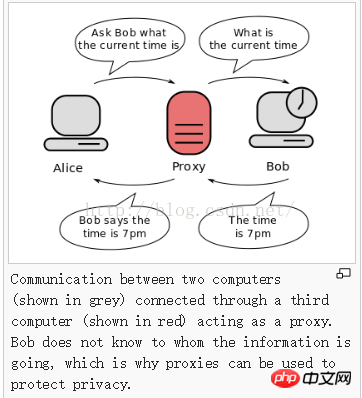
2. Why use a proxy server
1) Improve access speed
Since the data returned by the target host will be stored in the hard disk of the proxy server, the next time the customer accesses the same site data, it will be read directly from the hard disk of the proxy server, which plays a cache role, especially for Popular sites can significantly increase request speeds.
2) Firewall function
Since all client requests must access remote sites through the proxy server, restrictions can be set on the proxy server to filter certain unsafe information.
3) Access inaccessible target sites through proxy servers
There are many developed proxy servers on the Internet. When access is restricted, the client can access the target through unrestricted proxy servers. Site, in layman's terms, the circumvention browser we use uses a proxy server. Although it cannot go abroad, it can also directly access the external network.
2. Reverse proxy VS forward proxy
1. What is a forward proxy? What is a reverse proxy?
Forward proxy is set up between the client and the target host. It is only used to proxy the connection request from the internal network to the Internet. The client must specify the proxy server and send the request directly to the Web server. HTTP requests are sent to the proxy server.
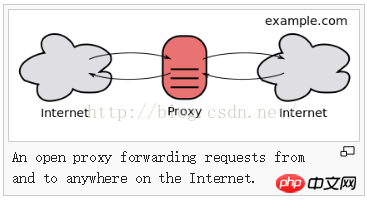
The reverse proxy server is set up on the server side. It relieves the workload of the server by buffering frequently requested pages and forwards client requests to the internal network. The target server; and returns the results obtained from the server to the client requesting a connection on the Internet. At this time, the proxy server and the target host appear as a server to the outside world.
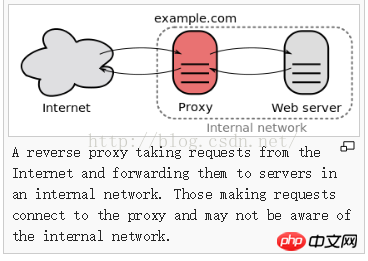
#2. What are the main applications of reverse proxy?
Many large web sites now use reverse proxies. In addition to preventing vicious attacks from the external network on intranet servers, caching to reduce server pressure and access security control, it can also perform load balancing and distribute user requests to multiple servers.
3. Directional proxy server Nginx
Nginx, as a popular reverse proxy server in recent years, is installed on the destination host and is mainly used to forward client requests. There are multiple HTTP servers in the background to provide services. The function of nginx is to forward the request to the subsequent server and decide which target host to handle the current request. The following demonstrates how to configure Nginx to function.
1. Simulate n http servers as target hosts
For testing, simply use 2 tomcat instances to simulate two http servers, and change the tomcat ports to 8081 and 8082 respectively
2. Configure IP domain name
192.168.72.49 8081.max.com
192.168.72.49 8082.max.com
3. Configure nginx.conf
upstream tomcatserver1 {
server 192.168.72.49:8081;
}
upstream tomcatserver2 {
server 192.168.72.49:8082;
}
server {
listen 80;
server_name 8081.max.com;
#charset koi8-r;
#access_log logs/host.access.log main;
location / {
proxy_pass http://tomcatserver1;
index index.html index.htm;
}
}
server {
listen 80;
server_name 8082.max.com;
#charset koi8-r;
#access_log logs/host.access.log main;
location / {
proxy_pass http://tomcatserver2;
index index.html index.htm;
}
}Process:
1) Access 8081.max.com with the browser and find the 192.168.72.49 server through local host file domain name resolution (Installing nginx)
2) The nginx reverse proxy accepts the client request, finds the server node with server_name 8081.max.com, and forwards the request to upstream tomcatserver1 according to the http path corresponding to proxy_pass, which is the port Tomcat server number 8081.
4. Effect display
Request 8081.max.com, tomcat1 receives and returns to the home page
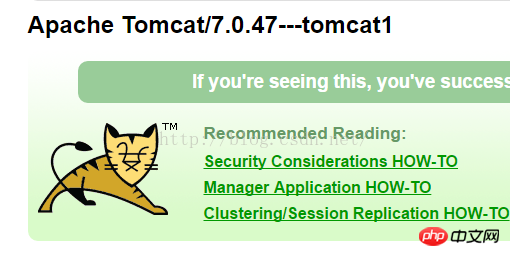
Request 8082.max.com, tomcat2 Receive and return to the homepage
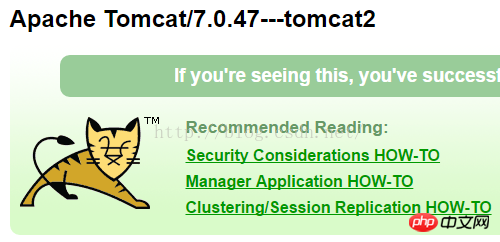
## IV. Summary
Through analysis, it is not difficult to conclude that, taking Baidu as an example, if the customer If the IP of the computer and the IP of Baidu server (target host) are in the same network segment, it will be like sending a request within the LAN, and the speed is extremely fast.But if this demand cannot be met and you still want to achieve a better request response, Baidu server can provide a public network IP in the same network segment as the target server, which is the IP of the reverse proxy service, through The proxy server forwards the client request and determines which of the N servers behind the scenes will handle the request. Since the reverse proxy server is on the same network segment as the target host, the access speed will be very fast.
When Nginx is used as a reverse proxy server, it is one of many reverse proxy servers. Through simple configuration, the client request can be forwarded to the designated server for processing by specifying the server IP or domain name address. ask.
The above is the detailed content of PHP uses Nginx to implement reverse proxy. For more information, please follow other related articles on the PHP Chinese website!

Hot AI Tools

Undresser.AI Undress
AI-powered app for creating realistic nude photos

AI Clothes Remover
Online AI tool for removing clothes from photos.

Undress AI Tool
Undress images for free

Clothoff.io
AI clothes remover

Video Face Swap
Swap faces in any video effortlessly with our completely free AI face swap tool!

Hot Article

Hot Tools

Notepad++7.3.1
Easy-to-use and free code editor

SublimeText3 Chinese version
Chinese version, very easy to use

Zend Studio 13.0.1
Powerful PHP integrated development environment

Dreamweaver CS6
Visual web development tools

SublimeText3 Mac version
God-level code editing software (SublimeText3)

Hot Topics
 1389
1389
 52
52
 PHP's Purpose: Building Dynamic Websites
Apr 15, 2025 am 12:18 AM
PHP's Purpose: Building Dynamic Websites
Apr 15, 2025 am 12:18 AM
PHP is used to build dynamic websites, and its core functions include: 1. Generate dynamic content and generate web pages in real time by connecting with the database; 2. Process user interaction and form submissions, verify inputs and respond to operations; 3. Manage sessions and user authentication to provide a personalized experience; 4. Optimize performance and follow best practices to improve website efficiency and security.
 PHP and Python: Code Examples and Comparison
Apr 15, 2025 am 12:07 AM
PHP and Python: Code Examples and Comparison
Apr 15, 2025 am 12:07 AM
PHP and Python have their own advantages and disadvantages, and the choice depends on project needs and personal preferences. 1.PHP is suitable for rapid development and maintenance of large-scale web applications. 2. Python dominates the field of data science and machine learning.
 PHP: Handling Databases and Server-Side Logic
Apr 15, 2025 am 12:15 AM
PHP: Handling Databases and Server-Side Logic
Apr 15, 2025 am 12:15 AM
PHP uses MySQLi and PDO extensions to interact in database operations and server-side logic processing, and processes server-side logic through functions such as session management. 1) Use MySQLi or PDO to connect to the database and execute SQL queries. 2) Handle HTTP requests and user status through session management and other functions. 3) Use transactions to ensure the atomicity of database operations. 4) Prevent SQL injection, use exception handling and closing connections for debugging. 5) Optimize performance through indexing and cache, write highly readable code and perform error handling.
 How to configure cloud server domain name in nginx
Apr 14, 2025 pm 12:18 PM
How to configure cloud server domain name in nginx
Apr 14, 2025 pm 12:18 PM
How to configure an Nginx domain name on a cloud server: Create an A record pointing to the public IP address of the cloud server. Add virtual host blocks in the Nginx configuration file, specifying the listening port, domain name, and website root directory. Restart Nginx to apply the changes. Access the domain name test configuration. Other notes: Install the SSL certificate to enable HTTPS, ensure that the firewall allows port 80 traffic, and wait for DNS resolution to take effect.
 How to check nginx version
Apr 14, 2025 am 11:57 AM
How to check nginx version
Apr 14, 2025 am 11:57 AM
The methods that can query the Nginx version are: use the nginx -v command; view the version directive in the nginx.conf file; open the Nginx error page and view the page title.
 How to start nginx server
Apr 14, 2025 pm 12:27 PM
How to start nginx server
Apr 14, 2025 pm 12:27 PM
Starting an Nginx server requires different steps according to different operating systems: Linux/Unix system: Install the Nginx package (for example, using apt-get or yum). Use systemctl to start an Nginx service (for example, sudo systemctl start nginx). Windows system: Download and install Windows binary files. Start Nginx using the nginx.exe executable (for example, nginx.exe -c conf\nginx.conf). No matter which operating system you use, you can access the server IP
 PHP: An Introduction to the Server-Side Scripting Language
Apr 16, 2025 am 12:18 AM
PHP: An Introduction to the Server-Side Scripting Language
Apr 16, 2025 am 12:18 AM
PHP is a server-side scripting language used for dynamic web development and server-side applications. 1.PHP is an interpreted language that does not require compilation and is suitable for rapid development. 2. PHP code is embedded in HTML, making it easy to develop web pages. 3. PHP processes server-side logic, generates HTML output, and supports user interaction and data processing. 4. PHP can interact with the database, process form submission, and execute server-side tasks.
 PHP vs. Python: Use Cases and Applications
Apr 17, 2025 am 12:23 AM
PHP vs. Python: Use Cases and Applications
Apr 17, 2025 am 12:23 AM
PHP is suitable for web development and content management systems, and Python is suitable for data science, machine learning and automation scripts. 1.PHP performs well in building fast and scalable websites and applications and is commonly used in CMS such as WordPress. 2. Python has performed outstandingly in the fields of data science and machine learning, with rich libraries such as NumPy and TensorFlow.




